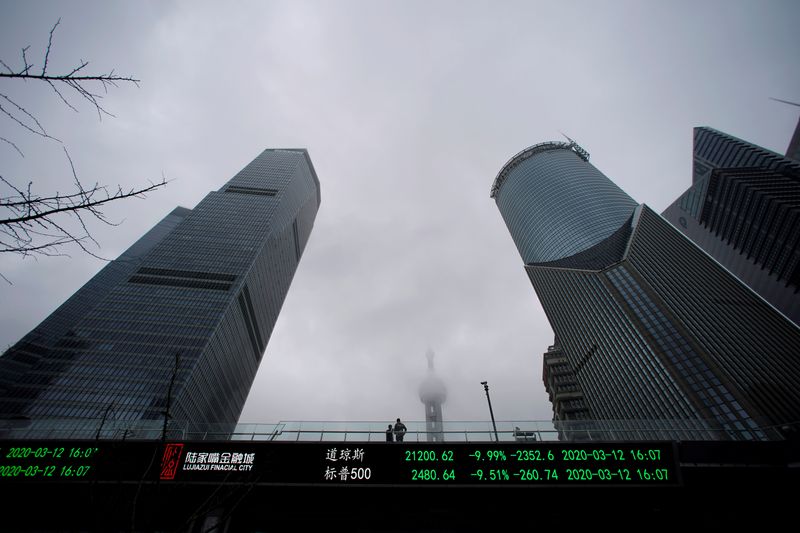By Noah Sin
HONG KONG (Reuters) - Wild swings in global equities markets are prompting brokers and fund managers to urge patience with a strategy still alien to many of China's momentum-driven stock investors: switch into companies offering high and stable dividends.
As companies around the world conserve cash by cutting dividends to survive the coronavirus pandemic, Chinese firms with stronger finances and state-backing hold out the prospect of being better able to sustain shareholder payouts.
Brokers believe Chinese corporate dividends will be worth seeking out as bonds become less rewarding, China's economy begins to recover quickly from the virus hit and officials continue with corporate reform to increase company payouts.
"Because the epidemic is better controlled in our country, we are more confident in the fundamentals of companies here," said Wang Wulei, an analyst at China Merchants Securities, who last month recommended seeking companies with payouts.
Some 641 A-share companies have announced 774.5 billion yuan ($109.6 billion) of dividends, more than 20% of 2019 net profits, Wang's analysis shows. The annualised return on the CSI dividend index, which tracks 100 stocks, was 3.3%.
By contrast, yields on 10-year Chinese government bonds (CN10YT=RR) fell to a fresh 17-year low of 2.503% on Tuesday, from 4.12% in January 2017.
Many of China's state-linked companies are leading the way on payouts. China Mobile (HK:0941) last month lifted its 2019 dividend by 24% and pledged a steady payout in 2020.
Despite pressures on margins, banks including Agricultural Bank of China (HK:1288) (SS:601288), Bank of China (HK:3988) (SS:601988), and oil producers Sinopec (HK:0386) (SS:600028) and PetroChina (HK:0857) (SS:601857) also pressed ahead with payout plans.
"Companies are announcing more attractive dividend policies," said Catherine Yeung, investment director at Fidelity International. "But given the volatility, it might not be a key focus (for most investors) right now."
Sheldon Zhang, Shanghai-based fund manager at Schroder Investment Management, said some long-term investors started switching from bonds in March, although the numbers were still relatively small.
Chinese blue-chip shares (CSI300) fell 11.5% in their biggest quarterly drop since the end of 2018, but fared better than many. The S&P 500 (SPX) dived 20%, for example, in its worst three months since the fourth quarter of 2008.
Nomura's analysis shows 48 of 100 top Chinese companies, excluding financial institutions, have net cash - where cash piles exceed their total debts - compared with just 18 of top firms in the United States.
While some Chinese companies may cut dividends in the short term due to the global slowdown, sector leaders could expand market share and payouts, said Lirong Xu, chief investment officer at Franklin Templeton Sealand Fund Management in Shanghai.
"These companies have good business strategies, cashflows, and even though their dividend yields are currently low, they have plans to raise them," he added.
Graphic - China dividend bond yields: https://fingfx.thomsonreuters.com/gfx/mkt/nmopawyxpab/China%20-%20dividend%20bond%20yields.jpg
IRON ROOSTERS RUFFLED
About 75% of companies pay dividends in China, and payout ratios climbed 6 percentage points between 2017 and 2019, according to reports by China Securities Index Company, a major index provider.
Regulators have for several years targeted so-called "iron roosters" - a term used for companies who do not pay dividends - as part of efforts to improve corporate governance by slowly weaning investors off their focus on quick capital appreciation instead of stable income.
Yield-seeking investors have also typically bought wealth management products or money market funds but these opportunities are narrowing as interest rates fall.
With interest rates likely to stay lower for longer, investors will seek better returns from other assets, such as high-yielding equities, said Lilian Leung, who manages JPMorgan (NYSE:JPM) Asset Management's China income fund.
In that respect, Chinese investors may begin to behave more like their peers in developed markets.
"What happens globally, institutional investors using high dividend yield stocks as alternatives to long-term bonds, will also happen in China," said Matthews Asia's Sherwood Zhang, who runs the firm's China and Asia income strategies.

Graphic - CSOP ETF dividend demand: https://fingfx.thomsonreuters.com/gfx/mkt/yzdpxqkyvxe/CSOP%20-%20dividend%20demand%20ETF.jpg
